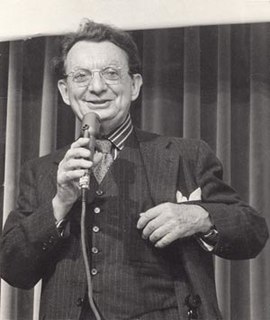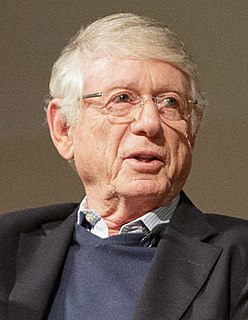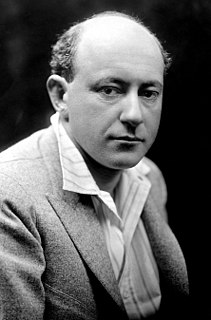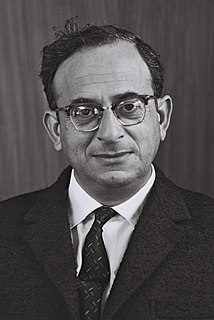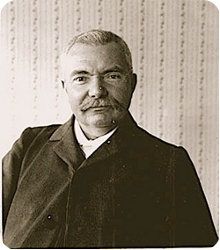A Quote by I. F. Stone
You have to take the long view. First, when Moses came down from Mt. Sinai, man has already progressed to the point where a commandment against cannibalism was no longer necessary. And, second, it's like pissing on a boulder. For the first few thousand years, you don't see any effect. But after that, you start to see a definite impact.
Related Quotes
I bring up 'The Heist,' and you can almost cut that record down the middle between songs where the beat came first and the words came second, and songs where the words came first and the beat came second. It can start with a vibe, a beat that drives a story, or it can start with a story and then trying to identify the tone to tell that story right.
The first slave came to Florida in 1526. The first one we know by name, Esteban, which means Stephen, came a couple of years later. So, we start with the stories of Juan Garrido and Esteban to show that African-American people have been here a century longer than anyone thought, and that the diversity we see in the African-American community today has existed since the beginning.
Pessimism is a very easy way out because it is a short view of life. If you look at what is happening around us today, you can't help but feel that life is a terrible complexity of problems. But if you look back a few thousand years, you realize that we have advanced fantastically. If you take a long view, I do not see how you can be pessimistic about the future of mankind.
Children, of course, don't understand at first that they are being cheated. They come to school with a degree of faith and optimism, and they often seem to thrive during the first few years. It is sometimes not until the third grade that their teachers start to see the warning signs of failure. By the fourth grade many children see it too.
To a sprinter, the hundred-yard dash is over in three seconds, not nine or ten. The first 'second' is when you come out of the blocks. The next is when you look up and take your first few strides to attain gain position. By that time the race is actually about half over. The final 'second' - the longest slice of time in the world for an athlete - is that last half of the race, when you really bear down and see what you're made of. It seems to take an eternity, yet is all over before you can think what's happening.
Every man should be born again on the first day of January. Start with a fresh page. Take up one hole more in the buckle if necessary, or let down one, according to circumstances; but on the first of January let every man gird himself once more, with his face to the front, and take no interest in the things that were and are past.
We have looked first at man with his vanities and greed and his problems of a day or a year; and then only, and from this biased point of view, we have looked outward at the earth he has inhabited so briefly and at the universe in which our earth is so minute a part. Yet these are the great realities, and against them we see our human problems in a different perspective. Perhaps if we reversed the telescope and looked at man down these long vistas, we should find less time and inclination to plan for our own destruction.
Man has made 32 million laws since THE COMMANDMENTS were handed down to Moses on Mount Sinai more than three thousand years ago, but he has never improved on God's law. THE TEN COMMANDMENTS are the principles by which man may live with God and man may live with man. They are the expressions of the mind of God for His creatures. They are the charter and guide of human liberty, for there can be no liberty without the law.
If the angel Gabriel came to me and said, 'Look, I'm willing to take your soul now and give it back to you at any period of time in the history of the nation of Israel, from the very beginning to this very day' - I think I would not think of any other time except for when Moses brought down the Ten Commandments from Mount Sinai.
A wise man from my home once told me that these mountains have seen far too much suffering and killing, and that each rock and every boulder you see represents a mujahadeen who died fighting either the Russians or the Taliban. Then the man went on to say that now that the fighting is finished, it is time to build a new era of peace-and the first step in that process is to take up the stones and start turning them into schools.
While the Passover narrative [in Exodus] energizes Israel's imagination toward justice, Israel's hard work of implementation of that imaginative scenario was done at Mt. Sinai. . . . Moses' difficult work at Sinai is to transform the narrative vision of the Exodus into a sustainable social practice that has institutional staying-power, credibility, and authority.
The just man is not the product of a day, but of a long brooding and a painful birth. To become a power for peace, a man must first pass through experiences which lead him to see things in their different aspects: it is necessary that he have a wide horizon, and breathe various atmospheres--in a word, from crossing, one after another, paths and points of view the most diverse, and sometimes the most contradictory, he must acquire the faculty of putting himself in the place of others and appreciating them.
